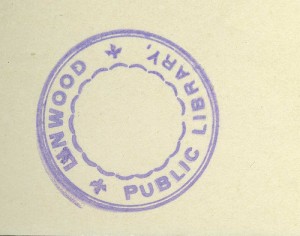 A few book buyers avoid former library books on principle alone. Without a doubt, circulation costs a manuscript a degree of aesthetic integrity, the same as any used copy, but outright rejection due to processing blemishes is a sophomoric approach. It generates a lost opportunity for both booksellers and the collectors who frequent their stores. Stamps, lending sheets, pockets, barcodes, covers, labels, and catalog numbers only decrease a book’s value rather than eliminate it entirely.
A few book buyers avoid former library books on principle alone. Without a doubt, circulation costs a manuscript a degree of aesthetic integrity, the same as any used copy, but outright rejection due to processing blemishes is a sophomoric approach. It generates a lost opportunity for both booksellers and the collectors who frequent their stores. Stamps, lending sheets, pockets, barcodes, covers, labels, and catalog numbers only decrease a book’s value rather than eliminate it entirely.
By no means should a buyer go to their public library and somewhat intentionally fail to return a heavily used first edition of an early Harry Potter. That’s not savvy; it’s unethical. Library circulation should be weighed against other factors to determine the book’s value and weighed heavily, too. The Rare Book Specialist at Powell’s City of Books, Ben Hunter, recommends a simple rule of thumb for pricing a library copy. He reduces the value of the manuscript by 80%. That’s before assessing its condition. While the steep discount speaks volumes about its lack of desirability, it also indicates that a truly rare book retains marginal value despite its defects.
The library processing matters less the older the book, too. Sometime ago at my university, I would browse our library’s stacks of musty Latin texts that featured prints of human faced animals. Obviously, I enjoyed my student library job. Strange, rare, and printed in the 16th century, they were most notably former library copies defaced by the librarians and technology of their era. But textbooks, such as these, in very good or better condition; however, retain more value than literature after being processed. In fact, a copy of a work by a famous instructor from the institution where he or she tenured may hold more interest for a collector, at the very least it will help the manuscript stand out.
In order to sell former library copies, they must be designated “Xlib” regardless of their condition. This acronym is placed alongside the Very Fine, Fine, Near Fine, Very Good, Good, Fair, or Poor in an assessment. If a buyer does not dismiss them and sellers identify them properly, former library books may again be appreciated as part of a collection. Don’t turn them all away on stubborn principles.
Carrie Bailey has appreciated book collecting since damaging a valuable copy of The Wizard of Oz as a child. She writes YA and promotes new writers on her blog Peevish Penman. Currently pursuing her Master’s in Information Studies, she enjoys working as a librarian, but dislikes barcodes.

I know more than a few people that prefer ex-library copies because they know they can get a ‘good deal’ on them. I also know one gentleman that made a fortune by following the philosophy of “Buy low & sell low but do it a whole lot of times.”
Agree with post and first commenter. Only way I was able to justify buying a copy of one of my old favorite children’s books was to go for the ex-lib. copy. Also, as a bookseller with a bricks-&-mortar streetfront store, I sell more often to readers than to collectors, and a good book is a good book, even with an old library stamp and pocket inside. My only complaint along these lines was one librarian, now retired, who used to slash through the front-facing endpaper and, inadvertently, several other pages when de-acquisitioning books. A simple “DISCARD” stamp is sufficient.
“…one librarian, now retired, who used to slash through the front-facing endpaper…”
To quote Charlie Brown, “ARRRRGHHH!”
Not retired soon enough in my opinion.
I once had a book whose only value was the library stamp in the front. It had come from Amache, the Japanese American relocation camp at Granada, Colorado. I gave it to the museum here, which is woefully lacking in items pertaining to that part of county history, because most of what was available people gave directly to the tiny Amache museum in Granada. Amache must have operated on donated books because the volume was horribly inappropriate for school kids.
Amache was named after a daughter of a local chief, the wife of the man our county was named after. There’s some sort of twisted irony there.
Personally, I love library books, but having worked as a librarian, I am afraid I may be terribly biased.